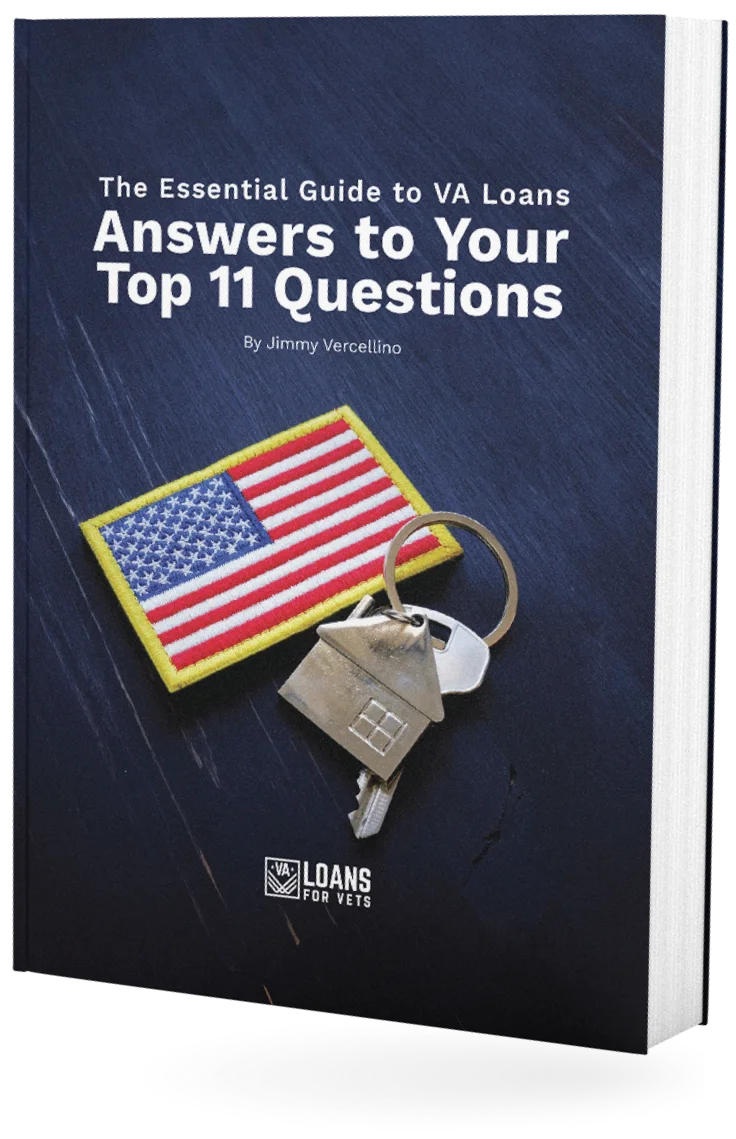Most people believe they are getting another home inspection when the VA requires them to get an appraisal. It might seem like a hurdle to have a second pair of eyes looking on the property before closing. But what you may not know is that VA Loans Appraisals have a different purpose than home inspections and are not the same.
You could be learning more about the VA Loan process before approaching a lender already. Or you might be stuck with an unhelpful lender that doesn’t communicate and value your time.
We would love to tell you more about what to look for in a VA Home Appraisal when buying a home. Whether you are active-duty military or a retired veteran, our team believes your sacrifice is worth our time.
What are VA Appraisals
VA Appraisals are home appraisals that Veterans Affairs (VA) requires before guaranteeing your VA Home Loan amount. Appraisal fees are one of a few closing costs you’ll pay on a VA Loan to settle in your dream home.
The lender cannot move you and your partner along to closing if the VA Appraisal does not check out. You can expect a VA-approved appraiser to show up at the home of interest after the seller has accepted your offer.
On the other hand, nothing would stop a lender from giving a home loan for a property with a value less than the mortgage. They have the final call on dispensing the home mortgage and another third party cannot reject them.
You can still decide to turn down the seller if the home inspection did not pass.
What Does a VA Appraisal Consist Of?
A VA appraisal, used for financing a home with a Department of Veterans Affairs (VA) loan, focuses on two key aspects: determining the property’s fair market value and ensuring it meets the VA’s Minimum Property Requirements (MPRs). Here’s a breakdown of what you can expect:
Determining Fair Market Value:
- Property Inspection: The appraiser will visit the property to walk through its interior and exterior, taking photos and noting its condition, size, layout, amenities, and overall quality.
- Comparable Sales Analysis: The appraiser compares the subject property to similar homes in the vicinity that have recently sold. This is called a “comparable sales analysis” and helps determine the fair market value based on current market trends.
- Adjustments: The appraiser might adjust the value of the comparable sales based on differences between the properties, such as size, age, amenities, and condition.
Ensuring Minimum Property Requirements (MPRs):
- Safety and Habitable Standards: The appraiser verifies that the property meets basic safety and habitable standards. This includes checks for structural integrity, roof and foundation stability, functional plumbing and electrical systems, adequate sanitation, and proper ventilation.
- Accessibility: For veterans with disabilities, the appraiser assesses whether the property meets any necessary accessibility requirements, such as wheelchair ramps or widened doorways.
- General Repairs: Any major repairs deemed necessary to bring the property up to MPR standards will be noted in the appraisal report.
Purpose of VA Appraisals
VA Appraisals are similar to home inspections in that they are visual lookovers of the home, putting a dollar amount on the property. You can compare it with how much the seller puts it up to see if you’re getting a fair price as a home buyer.
Quality Home Purchase
First and foremost, appraisal reports check for the quality of the home you want to purchase. It must be in good condition, free of hazards, and safe for your family to dwell in. They will also check crawl spaces and numerous other details on your behalf.
The military does not pay a generous income, so they want to save you from purchasing a home you’ll regret later. Compromising on a cheap home now will put you, your partner, and your kids at risk.
Minimal Property Requirements
They place a market value if your desired property meets the VA’s list of minimal property requirements (MRPs). These standards spot structural, foundational, and other home issues before you make the purchase at closing.
But they also require the seller to fix these problems, increasing the home’s sales price. A regular home inspection will not demand the seller to repair any items that compromise the property. But you would be wise to review that regular inspection documentation with your real estate agent.
Financial Protection
The VA’s job with appraisals is to ensure they protect you, the lender, and themselves. They want you to achieve the American Dream by living in the dream home you’ve fought so hard for. And remember all the families you’ve sacrificed for so they could raise their kids in a childhood home.
But they will not risk your finances and future peace by funding a home that breaks down. You do not want to settle down with your retired spouse or young family only to find thousands of dollars in home repair.
VA Appraisal Fees
VA appraisal fees vary depending on several factors, including the location of the property, the type of property, and the complexity of the appraisal. However, there are some general guidelines:
- Single-family homes: The typical fee for a VA appraisal of a single-family home is between $400 and $1,200.
- Condominiums and manufactured homes: The typical fee for a VA appraisal of a condominium or manufactured home is slightly lower than the fee for a single-family home, typically ranging from $300 to $1,000.
- Multi-unit properties: The typical fee for a VA appraisal of a multi-unit property, such as a duplex or triplex, is higher than the fee for a single-family home, typically starting around $500.
In addition to the base fee, there may also be additional charges for travel expenses, if the property is located far from the appraiser’s office, or for complex appraisals, such as appraisals of historic homes or properties with extensive renovations.
Keep an Eye on These VA Appraisal Items
After a VA Home Lender gives you a certified loan letter, you can start shopping and place the offer down. You should look for the following items on your VA Appraisal after the seller agrees to your offer and the appraisal occurs.
Home Repair Estimate
Again, the government appraiser will require the seller to fix any necessary hazards or home issues as opposed to an inspection. You want to underline and highlight those items so you and the seller are on the same page for what needs to happen.
They may decide to back out of selling the home to you due to the VA Appraiser’s demands. The appraisal could cause setbacks in home repair cases, but it will serve you and your family in the long run.
Detached Improvements
The benefit of VA Appraisals is that most times the appraiser will include detached improvements as part of the home’s overall value. Therefore, they will check swimming pools, sheds, and other amenities that home inspectors wouldn’t.
You want to be aware of this so you and your spouse can deliberate on the home purchase. The house may be perfect, but the detached improvements could be a priority for how you enjoy residential life.
Physical Disabilities
VA Appraisals are great because they consider any injuries or physical disabilities you may have received from service. They ensure the battles you’ve fought for our country don’t bar you from enjoying retirement or a first home purchase.
Your home loan case would then meet the VA’s requirement for being part of Specifically Adapted Housing (SAH). You need to contact The Regional Loan Center (RLC) in Phoenix for specific questions about how the inspector will accommodate your disabilities.
An experienced VA lender is another person you can ask to clarify these guidelines for you.
The Notice of Value (NOV)
You and your partner will receive a Notice of Value (NOV) from the VA Appraiser after they review your home top to bottom. The document will cover every MPR and the condition of the home along with its final market value.
7-10 business days will pass from when your loan officer orders the appraisal to the receiving the appraisal back. Your VA Home Lender will keep in close communication once they receive the report and everything is good for closing.
How Can I Check the Status of my VA Appraisal?
There are a few ways you can check the status of your VA appraisal:
- Through the VA Loan Electronic Review System (LERS): If you are a lender or loan servicer, you can access the status of your VA appraisal through the LERS system. This system provides real-time updates on the progress of your appraisal.
- By contacting your loan servicer: Your loan servicer can also provide you with the status of your VA appraisal. They will be able to tell you when the appraisal was ordered, when it is expected to be completed, and who the appraiser is.
- By contacting the VA directly: You can also contact the VA directly to inquire about the status of your appraisal. The VA’s main phone number is 1-800-827-1000.
We Serve You from Application to Closing
Most home lenders are notorious for poor communication or dragging on the VA Home Loan process. This makes it feel like forever before you get to the VA Appraisal and they could still delay with the final NOV. Your family and partner deserve a better experience with a lender that cares about your service.
We’re a veteran-run office that sets expectations before and not after you get rolling. Our team values open communication and honesty, so we leave our direct cell lines open so you can ask us anything. Buying your dream home and settling down does not have to be difficult.
You can reach Jimmy Vercellino directly by calling his personal phone at (602).908.5849. He would be thrilled to help get you started on the VA Loan Journey and even help you get approved based on your credit score.
Another VA Loan Specialist will pick up if he is tied up and pass you over to Jimmy as soon as possible.


